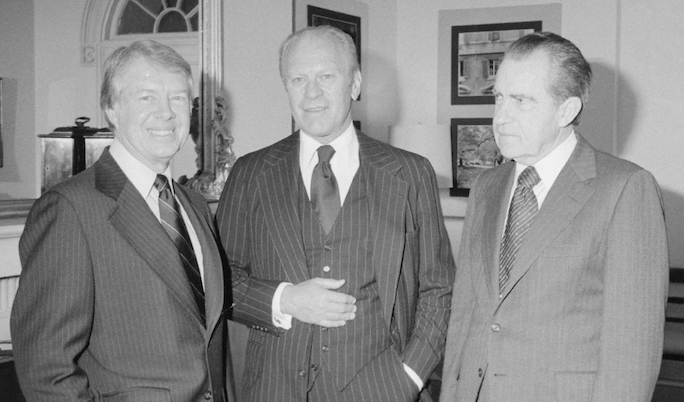
from When These Guys Were President
The mid-1990s inception of the private sector Internet – has led to the greatest economic and lifestyle leap forward in the history of humanity.
More than $1 trillion in private investment has taken us from 14K dial-up – to 1GB+ of speed. And hurtling ever upward.
And the whole thing is about to take yet another quantum leap forward with the ongoing, rolling rollout of the Fifth Generation (5G) wireless network.
The private Internet is now 1/6th of our $18 trillion economy – about $3 trillion per annum in economic activity.
The free speech-free market Xanadu that is the Internet – is entirely the creation of the free market. NOT of government.
Government has in fact been an ongoing, rolling impediment to this mind-boggling progress – not a contributor.
Local governments have been particularly awful. Engaging in massive shake downs of private Internet providers – imposing all sorts of exorbitant taxes and ridiculous mandates.
Government has already forced Internet providers to waste hundreds of billions of dollars on government rat holes – rather than spending it on, you know, better and faster Internet.
While all of this amazing private sector Internet success has been going on – Leftists have bizarrely insisted these local governments actually try to get into the Internet provider business.
The Case For Municipal Broadband
This paper should be MUCH shorter than it is. Seven words: “There isn’t a case for municipal broadband.”
We Need a Public Option for Broadband
Because the Obamacare public option was so outstanding.
We Need Affordable and Reliable Publicly-Accountable Broadband
Government – affordable and reliable? That’s like saying “We need short and slow NBA basketball players.” Reality is an impediment to the asserted demand.
We’ve wasted tens (hundreds?) of billions of dollars in the attempts. Wasted? Absolutely. Because these attempts…have been exceedingly awful. Just as anyone who knows anything about anything could have predicted. Oh – and we did.
Here’s an interactive map of very many of governments in very many places all failing in their attempts at being Internet providers.
Government can’t even get it going – because of my Wallet Rule:
If you go out on a Friday night with your wallet, and you go out the following Friday night with my wallet – on which Friday night are you going to have more fun?
Obviously, you’re going to have a whole lot more fun with my wallet – because you don’t care what my wallet looks like at the end of the evening.
Well, government is always on other peoples’ wallets – ours. In gambling parlance – they’re playing with house money.
Government will never spend money as wisely or well as the people who earned it – from whom government takes it.
Human nature is impossible to overcome. The Wallet Rule – is human nature.
And even if a government here or there manages to initially prop up some rudimentary form of Internet access – do you think it can come even close to keeping up with the lightening fast advances the private sector is perpetually making?
Here’s a hint: No frigging way.
America’s Cities Are Running on Software From the ’80s:
“Even San Francisco’s tech chops can’t save it from relying on computers that belong in a museum.
“The only place in San Francisco still pricing real estate like it’s the 1980s is the city assessor’s office. Its property tax system dates back to the dawn of the floppy disk.
“City employees appraising the market work with software that runs on a dead programming language and can’t be used with a mouse. Assessors are prone to make mistakes when using the vintage software because it can’t display all the basic information for a given property on one screen.
“The staffers have to open and exit several menus to input stuff as simple as addresses. To put it mildly, the setup ‘doesn’t reflect business needs now,’ says the city’s assessor, Carmen Chu.”
This is San Fran-freaking-cisco. The Tech Capital of Planet Earth. The government is awash in hundreds of millions of Silicon Valley tax dollars.
And they are running software, government-wide – from when Ronald Reagan was president. Back when there was still a Soviet Union. And acid wash jeans. And Max Headroom. And Spuds MacKenzie. (In deference to Millenial-and-younger readers – provided are links to these very dated pop culture references.)
If The Tech Capital of Planet Earth is three-plus decades behind – how do you think the federal government is doing?
Here’s a hint: Frigging terribly. In fact – even worse.
US Government Is Spending Billions on Old Tech that Barely Works, Says Watchdog:
“Three-quarters of the government’s IT budget goes to supporting legacy systems, some of which date back to the 1970s.”
Oh good – four-plus decades behind. Ahh…1970s tech. When Richard Nixon, Gerald Ford and Jimmy Carter were President. Back when there were gasoline lines (despite Bernie Sanders’ ridiculous efforts – lining up for life essentials is NOT a good thing). And bell bottom jeans. And the Bee Gees in bell bottom jeans. And Mikey liking Life Cereal. (Again, the even-more-dated references are linked up.)
Governments don’t keep up with comparatively infinitesimal software investments.
Yet the Left pretends to expect governments will do any sort of approximation of the private sector’s MASSIVE ongoing, rolling Internet investments.
That these COMPLETELY behind-the-tech-times governments – decades and DECADES behind-the-tech-times – will somehow manage to keep up with the private sector’s 21st Century Internet.
When they’re still running mid-20th Century software.
This is delusional.
Let’s acquiesce to Reality and human nature – and never again try to get the government into the Internet provider business.
Ever.
Please.
This first appeared in Red State.

